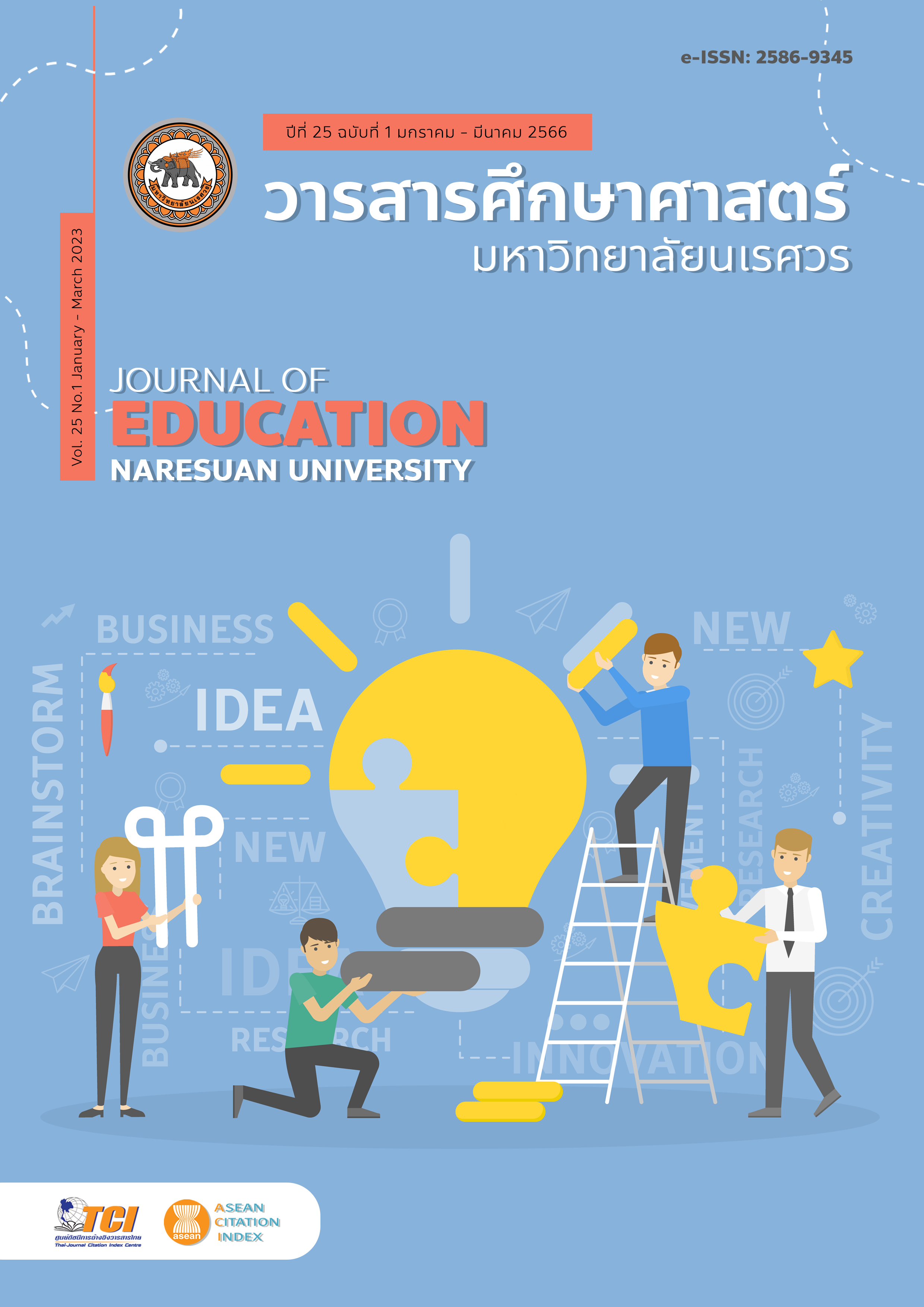THE DEVELOPMENT OF INSTRUCTONAL PROCESS USING STEM EDUCATION TO ENHANCE ABILITIES IN PRODUCING AND INSTRUCTING STEM LEARNING ACTIVITIES PACKAGES OF PRE-SERVICE SCIENCE TEACHERS การพัฒนากระบวนการจัดการเรียนรู้ตามแนวคิดสะเต็มศึกษาเพื่อส่งเสริมความสามารถในการผลิตและใช้ชุดกิจกรรมการเรียนรู้สะเต็มของนักศึกษาครูวิทยาศาสตร์
Main Article Content
Abstract
This research aimed to 1) develop the instructional process using stem education to enhance pre-service science teachers’ abilities in producing and instructing STEM learning activities packages, 2) study pre-service science teachers’ abilities in producing and instructing stem learning activities packages, and 3) study middle school students’ scientific conception through STEM learning activities packages. The research and development was used as a research methodology. The participants were 26 pre-service science teachers and 183 middle school students. The data were collected from the abilities assessment form, observation, interviews, and document analysis. Content analysis is used as data analysis tool and verified reliability by using resource triangulation. The research results indicated that 1) the developing instructional process consisted of 7 processes: (1) Introduction, (2) Analyze, Identify the Problem and Constraints, (3) Research and Brainstorm Possible Solution, (4) Plan and Design, (5) Build a Prototype, (6) Testing, Evaluation and Redesign, and (7) Presentation and Reflection. 2) After learning with the developed instructional process, most of the pre-service science teachers obtained a good for the abilities assessment test, and 3) the Middle school students’ scientific concepts are mostly sound understanding (SU) and partial understanding (PU) in a similar proportion.
Article Details

This work is licensed under a Creative Commons Attribution-NonCommercial-NoDerivatives 4.0 International License.
The owner of the article does not copy or violate any of its copyright. If any copyright infringement occurs or prosecution, in any case, the Editorial Board is not involved in all the rights to the owner of the article to be performed.
References
Bybee, R. (2013). The case for STEM education: challenges and opportunities. Arlington, VA: NSTA Press.
Chamrat, S. (2017). The definition of STEM and key features of STEM education learning activity. STOU Education Journal, 10(2), 13-34. [in Thai]
Chatmaneerungcharoen, S. (2019). Technological pedagogical content knowledge for STEM education in Thailand. Kasetsart Educational Review, 34(1), 51-64. [in Thai]
Dweck, C. S. (2008). Mindset: the new psychology of success. New York: Ballantine Books.
Haidar, A. (1997). Prospective chemistry teachers’ conception of conservation of matter and related concept. Journal of Research in Science Teaching, 34(2), 181-197.
Intalapaporn, C. (2015). Development of Training curriculum to enhance the ability of STEM education learning management for primary school teachers. Veridian E-Journal Silpakorn University, 8(2), 714-736. [in Thai]
Jungwongsuk, S., Pimsri, K., Kongkhan, T., Tangkawanich, W., & Sajjapatanakul, A. (2017). Problems and needs in practicum teaching experience of students in social study, education faculty, Pibulsongkram Rajabhat university. Journal of Faculty of Education Pibulsongkram Rajabhat University, 4(1), 12-22. [in Thai]
Kaewklom, W., Khumwong, P., & Dahsah, J. (2018). Current situation, problem and needs for STEM learning of primary science teacher. Veridian E-Journal Silpakorn University, 11(3), 2092-2112. [in Thai]
Karakul, R., & Nuangchalerm, P. (2015). The development of science activity packages based on constructivist theory for Mathayomsuksa 4. Prae-wa Kalasin Journal of Kalasin University, 3(2), 38-53. [in Thai]
Klinkajorn, P., Yutakom, N. & Veerapospong, T. (2018). Physics teachers’ understandings and teaching practices in accordance with science, technology, engineering and mathematics (STEM) education in a pre-Engineering school. Journal of Graduate Studies Valaya Alongkron Rajabhat University, 12(2), 146-156. [in Thai]
Koocharoenpisal, N., Wongwattana, J., & Buawkaew, P. (2019). Effect of science learning activity on light and visibility based on STEM education for lower secondary students. Journal of Education Naresuan University, 21(4), 166-182. [in Thai]
Ladachart, L., Phothong, W., Rittikoop, W., & Ladachart, L. (2019). Teachers’ understanding and views about STEM education and engineering design. Silpakorn University Journal, 39(3), 133-149. [in Thai]
Ministry of Education. (2016). The 12th national education plan of the Kingdom of Thailand. Retrieved May 10, 2019, from http://www.kknpeo.moe.go.th/2018 [in Thai]
National Research Council (NRC). (1997). Science teaching reconsidered: a handbook. Washington, DC: The National Academies Press.
Pimthong, P. (2018). STEM education. Bangkok: Vista Interprint. [in Thai]
Pleasants, J. (2020). Inquiring into the nature of STEM problems implications for pre-college education. Science & Education, 29, 831–855.
Roadrangka, V. (1997). Constructivism. Bangkok: Kasetsart University. [in Thai]
Saengpromsri, P. (2015). Comparisons of learning achievement, integrated science process skills, and attitude toward chemistry learning for Matthayomsueksa 5 students between STEM education and conventional methods. Journal of Education, Mahasarakham University, 9 (Special edition), 401-418. [in Thai]
Saito, T., Gunji, Y., & Kumano, Y. (2015). The problem about technology in STEM education: some findings from action research on the professional development & integrated STEM lessons in informal fields. K-12 STEM Education, 1(2), 85-100.
The Institute for the Promotion of Teaching Science and Technology (IPST). (2014). STEM education and engineering design process. Retrieved March 27, 2019, from http://www.stemedthailand.org/?knowstem=สะเต็มศึกษาและการออกแบบ [in Thai]
Triwaranyu, C. (2017). The development of the instructional process for enhancing student teachers’ ability in developing instructional innovation by using lesson study approach assisted by thinking and working processes based on the philosophy of sufficiency economy. Journal of Education Studies, 45(2), 21-40. [in Thai]
Vasques, J. A., Sneider, C., & Comer, M. (2013). STEM: lesson essentials, grades 3-8. Portsmouth, NH: Heinemann.
Vichaidit, C., & Faikhamta, C. (2017). Exploring orientation toward STEM education of pre-service science teachers. Rajabhat Maha Sarakham University Journal, 11(3), 165-174. [in Thai]
Yuyaem, V., Janmanee, R., & Pinwatana, K. (2017). The development of learning activities by using the storyline method of constructing science lesson. Journal of Graduate Studies in Northern Rajabhat Universities, 7(13), 125-132. [in Thai]


